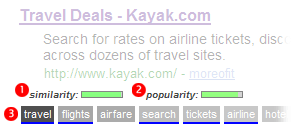You're looking for other sites like :
|
|
No information avaiable
http://www.pbs.org/idealab/2010/03/10-reasons-why-news-organizations-should-use-linked-data073.html
popularity:
semanticweb
linkeddata
journalism
data
semantic
seo
media
linked-data
news
linked
|
new
search by a custom tag signature
|
|
No information avaiable
similarity:
popularity:
twitter
journalism
ethics
transparency
socialmedia
objectivity
via:packrati.us
media
news
|
|
|
Thomson Reuters is the world's largest international multimedia news agency, ... business news, news alerts, personal finance, stock market, and mutual funds ...
similarity:
popularity:
news
blog
reuters
blogs
journalism
media
newspaper
wordpress
|
|
|
No information avaiable
similarity:
popularity:
skos
tagging
linkeddata
dc
semanticweb
folksonomy
taxonomy
semweb
blog
tags
|
|
|
No information avaiable
similarity:
popularity:
semanticweb
research
wikipedia
papers
reference
academic
search
resources
semantic
semantic_web
|
|
|
No information avaiable
similarity:
popularity:
journalism
media
slate
via:packrati.us
longform
strategy
stats
web
writing
onlinejournalism
|
|
|
Searchable archives which takes a snap shot of DrudgeReport.com every two minutes.
similarity:
popularity:
politics
news
conservative
media
journalism
history
archives
digital
internet
|
|
|
No information avaiable
similarity:
popularity:
semantic
reasoner
ontology
semanticweb
owl
reasoning
rdf
ai
wikipedia
swrl
|
|
|
Classify a web page using advanced semantic analysis, categorize your website ... URLclassifier. Powered by ContextIn.com Semantic Technology. URL ...
similarity:
popularity:
semanticweb
api
classification
semantic
webservices
url
research
web
semantics
website
|
|
|
How RDF Databases Differ from Other NoSQL Solutions by Arto Bendiken. Parsing and ... How to Build an SQL Storage Adapter for RDF Data with Ruby by Ben Lavender ...
similarity:
popularity:
rdf
blog
semanticweb
sparql
linkeddata
startup
datagraph
|
|
|
No information avaiable
similarity:
popularity:
census
media
watchdog
specialtyjournalism
journalism
news
reporting
blogs
blog
web
|
Sorting Results
- This slider determines how the matched sites are sorted.
- If you want to see the most popular sites that are somewhat related to your search, slide this more towards "popularity."
- If you want to see the sites that best matched your search, regardless of popularity, slide this towards "similarity."
Must Include Tags
- Matched sites will not be shown unless they have all of the tags on this list.
- This feature is useful for when you require a site to have been tagged as something.
- To add a tag to this list, click "add tag" or click on any tag in a result.
Must Not Include Tags
- Matched sites that have any tag on this list will not be shown.
- This feature is useful for filtering out results that have tags you are absolutely not interested in.
- To add a tag to this list, click "add tag" or click on any tag in a result.
Types of Results
- This option lets you specify the types of sites to show.
- If you want to only see domains (www.
.com), select "domains only." - If you want to only see articles (www.
.com/something/here), select "articles only." - If you don't care, or care so much about both, select "Both".
About The Results
 an example search result
an example search result
How moreofit Searches
Each website has a unique tag signature -- a set of words
that users have described the website as. Moreofit searches
for websites that have similar tag signatures and displays the results.
1: Similarity
A site's "similarity" is determined by how well its tag signature matches the tag
signature that is being searched for. A 100% match means that it has the exact same
tags in the exact same order, while a 0% match means it has no tags in common.
2: Popularity
The popularity of a website is, well, pretty much self explanatory.
3: Tag Signature
The tag signatures show how a site is described. The deeper the color of the tag,
the more frequently the website is tagged as this. Tags underlined blue denote a tag
that is in common with the search's tag signature.